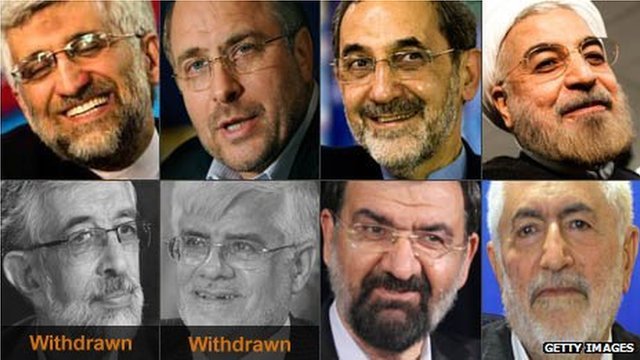Some 50 million voters across Iran are casting their ballots in the country’s key presidential elections.
Although all six candidates are seen as conservatives, one of them, cleric Hassan Rouhani, has been reaching out to the reformists in recent days.
The election will decide a successor to outgoing leader Mahmoud Ahmadinejad.
Mahmoud Ahmadinejad’s eight years in power have been characterized by economic turmoil and Western sanctions against Iran over its controversial nuclear programme.
Polls across Iran opened at 08:00 local time and are due to close at 18:00. Some 50 million people are eligible to cast their ballots.
The past week brought a surprising change to what otherwise had looked like being a predictable election.
Hassan Rouhani has been attracting increasing attention, speaking publicly about the need to re-engage with the West, our correspondent says.
He has also promised to free political prisoners and called for greater reform of the media.
The surge of support for him came after Mohammad Reza Aref, the only reformist candidate in the race, announced on Tuesday that he was withdrawing his candidature on the advice of pro-reform ex-President Mohammad Khatami.
Hassan Rouhani now has the endorsement of two ex-presidents, Mohammad Khatami and Akbar Hashemi Rafsanjani, who was disqualified from the race by the powerful Guardian Council.
However, Hassan Rouhani faces a tough challenge from hard-line candidates, including top nuclear negotiator Saeed Jalili and Tehran’s mayor Mohammad Baqer Qalibaf.

The remaining candidates are conservatives close to Iran’s supreme leader, Ayatollah Khamenei.
He has called for a large turnout but not publicly stated his preference for any single candidate.
After casting his vote early, Ayatollah Khamenei spoke live on state television.
“Inshallah [God willing], the Iranian people will create a new political epic,” he said.
He also attacked US criticism of the presidential poll and those, in the US, who said they did not recognize the election.
“The Iranian people… will do what is in their interest.”
If no candidate secures 50.1 percent or more of the votes to win outright, a second round will be held in a week’s time.
Friday’s election is the first since 2009, when protesters took to the streets in anger at the results which they said had been rigged in favor of Mahmoud Ahmadinejad.
But the disqualification of Akbar Hashemi Rafsanjani in May left supporters of the post-2009 liberal movement divided about whether to bother voting in the election at all.
No foreign observers will be monitoring the poll, and there have also been concerns that media coverage in the run-up was unfair.
Many reform newspapers have been shut down, access to the internet and foreign broadcasters restricted, and journalists detained.
Iranian presidential elections:
- Six candidates running
- Race is seen as contest between Ayatollah Ali Khamenei loyalists and moderate reformers
- About 50 million eligible voters
- If no candidate wins 50.1%, run-off held on June 21
[youtube 8A1iZpKlg8E]
